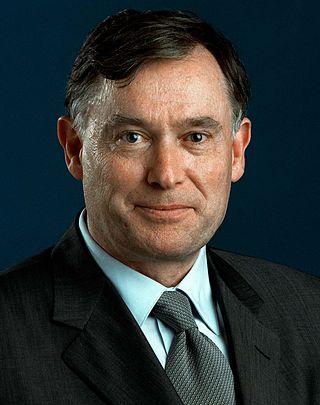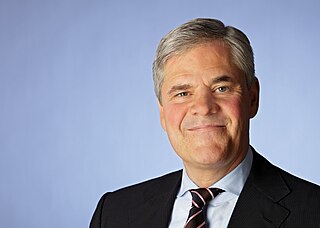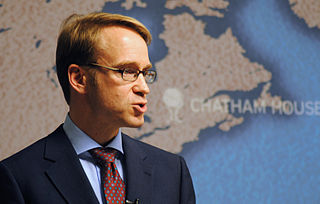
The Deutsche Mark,abbreviated "DM" or "D-Mark" ( ),was the official currency of West Germany from 1948 until 1990 and later the unified Germany from 1990 until the adoption of the euro in 2002. In English,it was typically called the "Deutschmark". One Deutsche Mark was divided into 100 pfennigs.

Horst Köhler is a German politician who served as President of Germany from 2004 to 2010. As the candidate of the two Christian Democratic sister parties,the CDU and the CSU,as well as the liberal FDP,Köhler was elected to his first five-year term by the Federal Convention on 23 May 2004 and was subsequently inaugurated on 1 July 2004. He was reelected to a second term on 23 May 2009. Just a year later,on 31 May 2010,he resigned from his office in a controversy over a comment on the role of the German Bundeswehr in light of a visit to the troops in Afghanistan. During his tenure as president,whose office is mostly concerned with ceremonial matters,Köhler was a highly popular politician,with approval rates above those of both Chancellor Gerhard Schröder and later Chancellor Angela Merkel.

The Deutsche Bundesbank is the German member of the Eurosystem and has been the monetary authority for Germany from 1957 to 1998,issuing the Deutsche Mark (DM). It succeeded the Bank deutscher Länder,which had introduced the DM on 20 June 1948.

Hans Eichel is a German politician (SPD) and the co-founder of the G20,or "Group of Twenty",an international forum for the governments and central bank governors of twenty developed and developing nations to discuss policy issues pertaining to the promotion of international financial stability.

Axel Alfred Weber is a German economist,professor,and banker. He is currently a board member and chairman of Swiss investment bank and financial services company,UBS Group AG,and has announced his resignation effective 7 April 2022.

Hans Tietmeyer was a German economist and regarded as one of the foremost experts on international financial matters. He was president of Deutsche Bundesbank from 1993 until 1999 and remained afterwards one of the most important figures in finance of the European Union.

The Federal Financial Supervisory Authority,better known by its abbreviation BaFin,is Germany's integrated financial regulatory authority. Since 2014,it has been Germany's national competent authority within European Banking Supervision. It is an independent federal institution with headquarters in Bonn and Frankfurt and falls under the supervision of the Federal Ministry of Finance. BaFin supervises about 2,700 banks,800 financial services institutions,and over 700 insurance undertakings.

Andreas Raymond Dombret is a German-American banker who served as member of the executive board of the Deutsche Bundesbank from 2010 until 2018. In that capacity,he held responsibility for Banking and Financial Supervision,Risk Controlling and the Bundesbank's Representative Offices abroad.

Peter Bofinger is a German economist and a former member of the German Council of Economic Experts.

Gerhard Fritz Kurt "Gerd" Schröder is a German former politician who served as Chancellor of Germany from 1998 to 2005. From 1999 to 2004,he was also the Leader of the Social Democratic Party of Germany (SPD). As chancellor,he led a coalition government of the SPD and Alliance 90/The Greens. Since leaving public office,Schröder has worked for Russian state-owned energy companies,including Nord Stream AG,Rosneft,and Gazprom.

Jens Weidmann is a German economist who served as president of the Deutsche Bundesbank between 2011 and 2021. He also served as chairman of the Board of the Bank for International Settlements (BIS).

David Wayne Marsh is a British financial specialist,business consultant and writer on political,economic and monetary issues.

Helmut Schlesinger was a German economist and President of the Bundesbank from 1991 to 1993. Having worked for the institution and its precursor from 1952,he pursued monetary stability.

Anton "Toni" Hofreiter is a German politician who has been serving as a member of the Bundestag since the 2005 elections.

Isabel Schnabel is a German economist who has been serving as a member of the Executive Board of the European Central Bank since 2020.

Jakob von Weizsäcker is a German economist and politician of the Social Democratic Party (SPD) who has been serving as State Minister of Finance in the government of Minister-President of the Saarland Anke Rehlinger since the 2022 state elections.

Heiner Flassbeck is a German economist and public intellectual. From 1998 to 1999 he was a State Secretary in the German Federal Ministry of Finance where he also advised former finance minister Oskar Lafontaine on a reform of the European Monetary System. He became the Chief of Macroeconomics and Development of the United Nations Conference on Trade and Development (UNCTAD) in Geneva in January 2003,a position that he held until resigning at the end of 2012 due to his age.

Thomas Mirow is a German politician of the Social Democratic Party who served as president of the European Bank for Reconstruction and Development from 2008 to 2012.

Danae Kyriakopoulou is a Greek economist who is currently the Official Monetary and Financial Institutions Forum (OMFIF)'s Chief Economist and Director of Research. Kyriakopoulou is the head of OMFIF's economic staff,providing leadership and direction in the economic research agenda. She is fluent in English,German,Greek,and Spanish. Kyriakopoulou is a macroeconomist who often is asked to speaker and contributor for international publications,conferences and the media.
Joachim Nagel is a German economist who has been serving as President of the Bundesbank since 2022. Before he was a senior manager of the Bank for International Settlements since 2020,having been a member of the board of the Deutsche Bundesbank from 2010 to 2016 and then a member of the board of the KfW Bankengruppe from 2017 to 2020. He was appointed President of the Deutsche Bundesbank on 1 January 2022,to replace Jens Weidmann. He is a member of the Social Democratic Party of Germany (SPD),along with the President who appointed him to serve initially under SPD Chancellor Olaf Scholz.



















